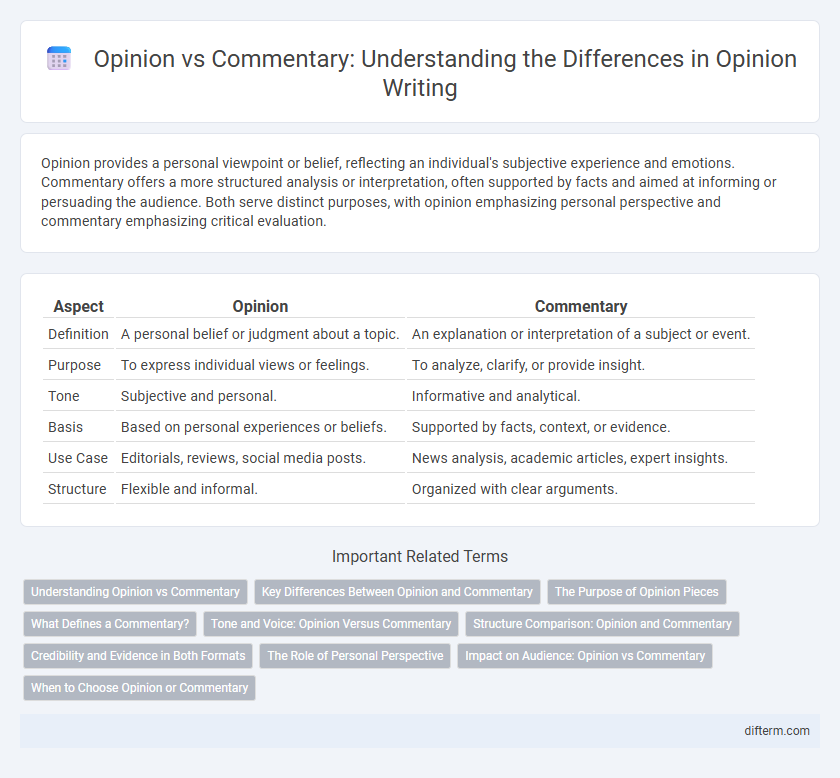Opinion provides a personal viewpoint or belief, reflecting an individual's subjective experience and emotions. Commentary offers a more structured analysis or interpretation, often supported by facts and aimed at informing or persuading the audience. Both serve distinct purposes, with opinion emphasizing personal perspective and commentary emphasizing critical evaluation.
Table of Comparison
| Aspect | Opinion | Commentary |
|---|---|---|
| Definition | A personal belief or judgment about a topic. | An explanation or interpretation of a subject or event. |
| Purpose | To express individual views or feelings. | To analyze, clarify, or provide insight. |
| Tone | Subjective and personal. | Informative and analytical. |
| Basis | Based on personal experiences or beliefs. | Supported by facts, context, or evidence. |
| Use Case | Editorials, reviews, social media posts. | News analysis, academic articles, expert insights. |
| Structure | Flexible and informal. | Organized with clear arguments. |
Understanding Opinion vs Commentary
Opinion expresses a personal belief or judgment about a subject, rooted in individual perspective, while commentary provides an explanation or analysis that offers context and deeper insight. Understanding the distinction helps readers differentiate subjective viewpoints from interpretative narratives. This clarity enhances critical thinking and enables more informed engagement with various texts.
Key Differences Between Opinion and Commentary
Opinion reflects a personal belief or judgment about a subject, often subjective and based on individual values or experiences. Commentary provides analysis or explanation of events, aiming to inform or persuade by interpreting facts and offering insight. The key difference lies in opinion expressing personal views, while commentary objectively examines and contextualizes information.
The Purpose of Opinion Pieces
Opinion pieces aim to express personal viewpoints and subjective interpretations on specific issues, providing readers with unique perspectives grounded in individual beliefs or experiences. Commentary, in contrast, often involves in-depth analysis and critique of events or topics, focusing on informing and engaging the audience with broader context and implications. The primary purpose of opinion pieces is to influence public thought and spark debate by presenting clear, persuasive stances on current affairs.
What Defines a Commentary?
A commentary is defined by its focused analysis and interpretation of events, providing a deeper understanding rather than just expressing a personal opinion. It often incorporates factual information and context to support its arguments, distinguishing it from a straightforward opinion piece. The purpose of commentary is to inform and engage readers by offering insights that go beyond subjective viewpoints.
Tone and Voice: Opinion Versus Commentary
Opinion pieces showcase an author's personal voice and emotional tone, emphasizing subjective experience and perspective to engage readers directly. Commentary maintains a more neutral, analytical tone, focusing on interpreting facts and events without overt emotional language. The distinct voice in opinion writing invites debate, while commentary aims to inform through balanced examination.
Structure Comparison: Opinion and Commentary
Opinion pieces typically present a clear, subjective stance supported by personal reasoning and selective evidence, structured around a central thesis that guides the reader through the author's viewpoint. Commentary, while also reflecting personal views, emphasizes analysis and interpretation of events or works, often structured to explore multiple facets or implications of the subject matter. Both formats prioritize clarity and persuasion but differ in that opinion focuses on asserting a position, whereas commentary aims to provide deeper insight and contextual understanding.
Credibility and Evidence in Both Formats
Opinion pieces often rely on personal beliefs and subjective interpretation, which can challenge their credibility without supporting evidence. Commentary integrates analysis with factual data, enhancing trustworthiness through references and contextual information. Both formats require clear sourcing and transparent argumentation to maintain audience confidence and informational value.
The Role of Personal Perspective
Opinion pieces offer a unique insight shaped by the author's personal beliefs and experiences, providing readers with subjective viewpoints that drive emotional engagement. Commentary, while also reflecting individual perspectives, tends to analyze events or topics with a more balanced, interpretive approach aimed at informing or influencing public discourse. Emphasizing personal perspective in opinion writing fosters a connection between writer and audience, enhancing the impact through authentic, relatable expression.
Impact on Audience: Opinion vs Commentary
Opinion directly influences the audience by expressing personal beliefs and emotions, creating a strong emotional connection that often drives persuasion and action. Commentary offers analysis and context, guiding the audience to understand complex issues without necessarily imposing the commentator's viewpoint. The impact of opinion lies in its subjective appeal, whereas commentary shapes thought through objective examination and critical insight.
When to Choose Opinion or Commentary
Opinion pieces express a clear personal viewpoint based on individual beliefs or experiences, making them ideal for persuading readers or sparking debate on subjective topics. Commentary provides analysis or interpretation of events, focusing on explaining context and implications, which suits complex issues requiring detailed understanding. Choosing between opinion and commentary depends on the intent to either influence emotions and perspectives or to inform and clarify information for a broader audience.
opinion vs commentary Infographic

 difterm.com
difterm.com